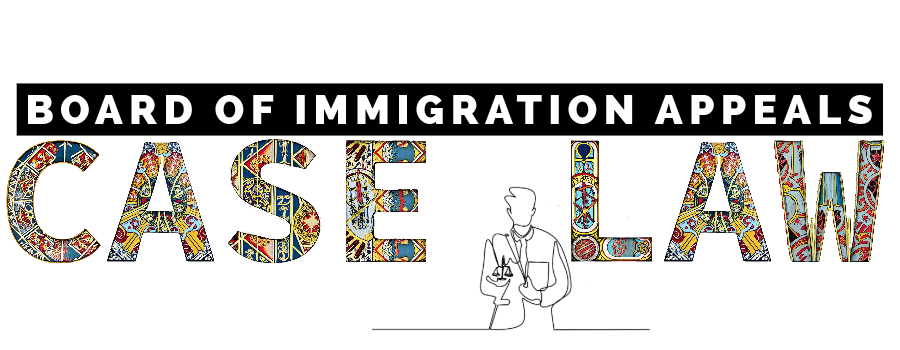
Matter of H. N. Ferreira, 28 I&N Dec. 765 (BIA 2023)
Given the significance of a respondent’s interest in securing review of a denial of a petition to remove the conditions on permanent residence, an Immigration Judge should ordinarily review the denial of a Form I-751 upon the request of the respondent. [Full Decision] Matter of H. N. Ferreira, 28 I&N Dec. 765 (BIA 2023) At a 2019 hearing before the Immigration Judge, DHS indicated that it did not have the respondent’s file and sought a continuance to locate it. The respondent did not object but asked that the proceedings move forward as quickly as possible to obtain review of USCIS’ decision denying his most recent I-751 petition to remove the conditions on his residence. The Immigration Judge continued the case for one month. At the next hearing, DHS still had not located the respondent’s file. The Immigration Judge asked the DHS attorney if she was moving to terminate for failure to prosecute the case, and the DHS attorney indicated that she was. The respondent objected on the grounds that the government “can only move for dismissal on enumerated grounds . . . [a]nd failure to find its file is not one of them.” Matter of H. N. Ferreira, 28 I&N Dec. 765 (BIA 2023) The respondent objected on the grounds that the government “can only move for dismissal on enumerated grounds . . . [a]nd failure to find its file is not one of them.” The respondent also contended that terminating removal proceedings would leave him without an avenue for review of USCIS’ denial of his Form I-751, which at that point he had been seeking for nearly a decade. The Immigration Judge granted DHS’ motion to terminate the removal proceedings on the ground that the court lacked jurisdiction tointerfere with DHS’ prosecutorial discretion. The respondent timely appealed. The Board found that Congress has provided that a decision by USCIS to terminate anoncitizen’s conditional permanent resident status is reviewable in removal proceedings by the Immigration Judge. See INA § 216(b)(2), (c)(3)(D), 8 U.S.C. § 1186a(b)(2), (c)(3)(D). Under current regulations, this is the only permitted avenue for review. See 8 C.F.R. § 1216.3(a); cf. 8 C.F.R. § 1216.5(f) (2023) (“No appeal shall lie from the decision of the director [to deny a waiver of the joint filing requirement]; however, the alien may seek review of such decision in removal proceedings.”). Where the basis for USCIS’ denial of a Form I-751 petition is the denial of a waiver of the joint filing requirement, the Immigration Judge reviews the denial of the waiver as well. See 8 C.F.R. § 1216.5(f); Matter of Bador, 28 I&N Dec. at 642 (collecting authority); see also Matter of Herrera Del Orden, 25 I&N Dec. 589, 593–95 (BIA 2011) (discussing the scope of the Immigration Judge’s review of the denial of an applicant’s request for a waiver of the joint filing requirement). Because DHS does not have unilateral authority to cancel a Notice to Appear once removal proceedings have commenced, DHS’ motion to terminate constituted a request that the Immigration Judge exercise his authority to terminate the proceedings. See Matter of G-N-C-, 22 I&N Dec. at 284. The Immigration Judge has authority to adjudicate this request “based on an evaluation of the factors underlying the [DHS’] motion.” Id. The Immigration Judge erred in concluding that he was required to terminate proceedings simply because DHS had moved to do so. Instead, the Immigration Judge should have adjudicated the motion after considering the underlying facts and circumstances. Because the Immigration Judge mistakenly concluded that DHS’ motion divested him of jurisdiction, he did not consider the respondent’s interest in obtaining review of USCIS’ denial of his Form I-751 petition. The respondent’s interest in having an Immigration Judge review USCIS’ denial of a Form I-751 is significant. Regulations provide that when USCIS terminates conditional permanent resident status by denying a Form I-751, there is no appeal from that decision to any higher authority within USCIS, and the noncitizen must be placed in removal proceedings. 8 C.F.R. § 1216.3(a). At that point, the denial of the Form I-751, and any associated waivers, is reviewable only by the Immigration Judge. See INA § 216(b)(2), (c)(3)(D), 8 U.S.C. § 1186a(b)(2), (c)(3)(D); 8 C.F.R. §§ 1216.3(a), 1216.5(f); Matter of Bador, 28 I&N Dec. at 642. The appeal was sustained and the case was remanded to the Immigration Judge to review the Respondent’s petition to remove conditions on his residency. See full decision here.




